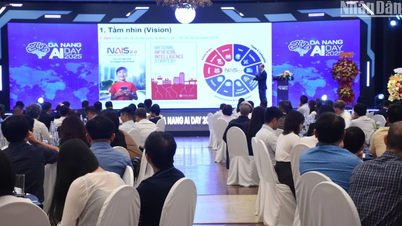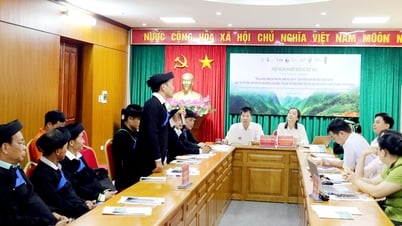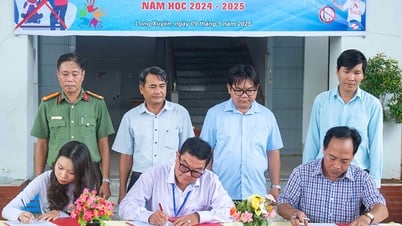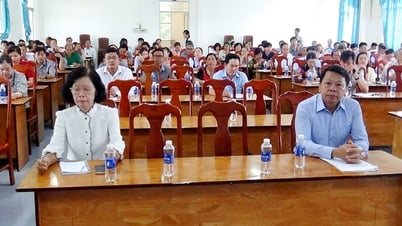The Resolution creates the foundation for the formation of many new policies, which are welcomed by the business community as a golden opportunity for development and breakthrough.
The subject leading innovation
Resolution No. 68-NQ/TW is not a favor to a single economic sector, but an inevitable step in the overall strategy for national development. Together with Resolution No. 57-NQ/TW, Resolution No. 68-NQ/TW has demonstrated a breakthrough policy of strongly shifting research and development activities to create new products, services, and processes (R&D) from research institutes and universities to enterprises through the establishment of research institutes and scientific centers belonging to corporations and enterprises. At the same time, R&D activities at universities are also associated with applied research and transfer.
The establishment of a research system in corporations and enterprises is in correlation with public research institutions, with clear strategic goals. The public research institutions solve key national scientific and technological problems, basic research, and are heavily invested to focus on research and development of fundamental and core technologies as a long-term foundation for the entire economy.
Meanwhile, business research closely linked to market demand and production applications will narrow the research lag, helping research results quickly enter life. The State's seed capital for business research will stimulate and mobilize business investment capital, and therefore, each technological problem will receive a very large total investment capital from society.
One of the new points of Resolution No. 68-NQ/TW (Resolution) is to demonstrate political determination in positioning and affirming more clearly the role and mission of the private economic force in the era of national development.
One of the new points of Resolution No. 68-NQ/TW (Resolution) is to demonstrate political determination to position and affirm more clearly the role and mission of the private economic force in the era of national development. According to lawyer Truong Anh Tu, Chairman of Truong Anh Tu Law Company Limited, Standing Member of the Central Committee of the Vietnam Environmental Economics Association, the institutional reform contents mentioned in the Resolution are not simply procedural reform, but rather a restructuring of governance thinking, in which public power is clearly defined and operates within its limits to better serve businesses, people and the common development goals.
Resolution No. 68-NQ/TW is closely linked to Resolution No. 57-NQ/TW in placing the role and mission of private enterprises not only in economic development but also as the main force of science, technology, innovation and digital transformation activities. In addition, instead of considering enterprises as the ones who carry out innovation, the Resolution considers innovation and digital transformation as the main lever to help enterprises develop and improve their competitiveness.
According to Mr. Pham Duc Nghiem, Deputy Director of the Department of Startups and Technology Enterprises (Ministry of Science and Technology), this reverse approach demonstrates modern policy thinking, considering innovation and digital transformation not only as professional activities, but also as strategic tools to elevate private enterprises and create breakthroughs in the economy. The Resolution is built very closely and feasible, when enterprises understand the nature and the path they need to take, the implementation of the Resolution will be effective.
Businesses waiting for policy approval
Receiving Resolution No. 68-NQ/TW, many businesses said that the Resolution is like a breath of fresh air, fueling the aspirations of private businesses to rise.
According to Mr. Phan Van Hieu, Chairman of the Board of Directors of CVI Pharmaceutical and Cosmetic Joint Stock Company, private enterprises, including pharmaceutical enterprises, will receive more support in research, production and distribution, thereby creating high-quality products, meeting domestic demand and reaching out to international markets. One of the important highlights of Resolution No. 68-NQ/TW is the “sandbox” mechanism that allows enterprises to apply new technologies such as artificial intelligence, blockchain or biotechnology without being bound by old regulations.
This paves the way for high-tech pharmaceutical startups to develop innovative solutions, from new drug research to smart supply chain management. The application of the “sandbox” mechanism requires close supervision to ensure safety and effectiveness, especially in the pharmaceutical sector which is directly related to consumer health. In addition, access to capital remains a major barrier for many pharmaceutical technology startups, especially in localities. The issue of intellectual property protection also needs more attention to encourage businesses to boldly invest in innovation and development of new products.
Enterprises believe that to make the most of the opportunities from Resolution No. 68-NQ/TW, the support of the State and relevant parties is very important. The State needs to soon issue detailed instructions to effectively implement the mechanisms.
Enterprises believe that to make the most of the opportunities from Resolution No. 68-NQ/TW, the support of the State and relevant parties is very important. The State needs to soon issue detailed instructions to effectively implement the mechanisms.
According to Mr. Pham Duc Nghiem, Deputy Director of the Department of Startups and Technology Enterprises, to help the business community, especially small and medium-sized enterprises, proactively participate in the country's development, there needs to be synchronous solutions from both the State and the business community. The Government needs to promote the reduction of administrative procedures, simplify regulations on taxes, business licenses, and investment licensing. In addition, it is necessary to develop financial support policies such as preferential loan funds and technology investment support programs for small and medium-sized enterprises, to help them access the necessary resources for development. This support will be the foundation for businesses to stabilize and develop in an increasingly competitive environment.
The Government needs to have policies to directly support businesses in applying digital technology and innovation, such as supporting human resource training in information technology, artificial intelligence, big data, and the Internet of Things for small and medium-sized enterprises; at the same time, creating platforms for connecting businesses so that they can share experiences, resources, and create new products and services.
An important factor for businesses to develop and improve their competitiveness is to cooperate closely with research and development (R&D) organizations, research institutes and universities. The government can support by creating public-private partnership (PPP) programs in the field of research and development, thereby helping businesses access public resources such as facilities, research infrastructure, high-quality human resources, thereby improving the endogenous technological capacity of businesses.
The State needs to have policies to encourage domestic enterprises to participate in key national investment projects such as airports, seaports, highways, nuclear power... from research to project implementation so that they can gradually master the technology.
In addition, it is necessary to promote and support creative startups through the formation of support funds, building support platforms, such as innovation centers to help develop creative startup models, provide new products, services and economic growth.
Source: https://nhandan.vn/dong-luc-trong-he-sinh-thai-doi-moi-sang-tao-post878403.html



![[Photo] Magical moment of double five-colored clouds on Ba Den mountain on the day of the Buddha's relic procession](https://vphoto.vietnam.vn/thumb/1200x675/vietnam/resource/IMAGE/2025/5/9/7a710556965c413397f9e38ac9708d2f)














![[Photo] Prime Minister Pham Minh Chinh chairs a special Government meeting on the arrangement of administrative units at all levels.](https://vphoto.vietnam.vn/thumb/402x226/vietnam/resource/IMAGE/2025/5/9/6a22e6a997424870abfb39817bb9bb6c)


![[Photo] Magical moment of double five-colored clouds on Ba Den mountain on the day of the Buddha's relic procession](https://vphoto.vietnam.vn/thumb/402x226/vietnam/resource/IMAGE/2025/5/9/7a710556965c413397f9e38ac9708d2f)




![[Photo] General Secretary To Lam begins official visit to Russia and attends the 80th Anniversary of Victory over Fascism](https://vphoto.vietnam.vn/thumb/1200x675/vietnam/resource/IMAGE/2025/5/8/5d2566d7f67d4a1e9b88bc677831ec9d)































































Comment (0)